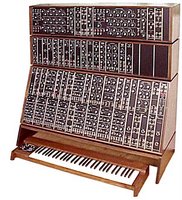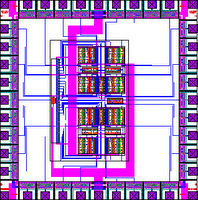The Return of the Analogue
 In my recent Computation Thinking presentation, I suggested that the Analogue might be making a come back - well the signs are there and growing ;)...
In my recent Computation Thinking presentation, I suggested that the Analogue might be making a come back - well the signs are there and growing ;)...Below are links I have found that suggest this to be the case.
There are some strong academic arguments to support this view and developments of real applications, its much more that a sentimental reminescence of the past - Moog Analogue Synthesisers, warm valves (sigh :)
[ and even these are making a comeback
NAMM 2006: Modular Analog Synthesizers Return! ]
1. Jonathan Mills - Extended Analogue Computer
 "I've been working on analog computing since 1990 when I invented,and my students and I built, the first Lukasiewicz Logic Arrays.This is an image of the first VLSI LLA, which is still used as a comparison benchmark for other designs."
"I've been working on analog computing since 1990 when I invented,and my students and I built, the first Lukasiewicz Logic Arrays.This is an image of the first VLSI LLA, which is still used as a comparison benchmark for other designs."[more]
News May 2006:
Distributed Analog Supercomputer prototype to be built
Issue date: 23/05/2006
 Professor Jonathan Mills of Indiana University (USA), one of the world's leading experts in analog computers, is to work at the Faculty of Computing, Engineering and Mathematical Sciences (CEMS), of the University of the West of England, to develop and build the world's first prototype of a Distributed Analog Supercomputer. The work will be carried out during Professor Mills nine month Leverhulme Trust Visiting Professorship at UWE. [more]
Professor Jonathan Mills of Indiana University (USA), one of the world's leading experts in analog computers, is to work at the Faculty of Computing, Engineering and Mathematical Sciences (CEMS), of the University of the West of England, to develop and build the world's first prototype of a Distributed Analog Supercomputer. The work will be carried out during Professor Mills nine month Leverhulme Trust Visiting Professorship at UWE. [more]Ryan R. Varick: The HCI of Analog
(Capstone project)
I believe analog is form of natural computation, suited to the types of things that we, as humans, are good at. I further believe that we are so used to throwing hardware at a problem that we sometimes overlook alternative solutions. My research seeks to identify the role of analog computing in a digital-dominated world. [more]
2. Non-Classical Computing
A 'most-excellent' paper by Susan Stepney and colleagues:
Journeys in Non-Classical Computation
A Grand Challenge for Computing Research
"Classical computing is an extraordinary success story.
However, there is a growing appreciation that it encompasses an extremely small subset of all computational possibilities...Six classical paradigms to disbelieve before breakfast [more]
see also UK Computing Research Comittee website:
Grand Challenges for Computer Research

0 Comments:
Post a Comment
<< Home